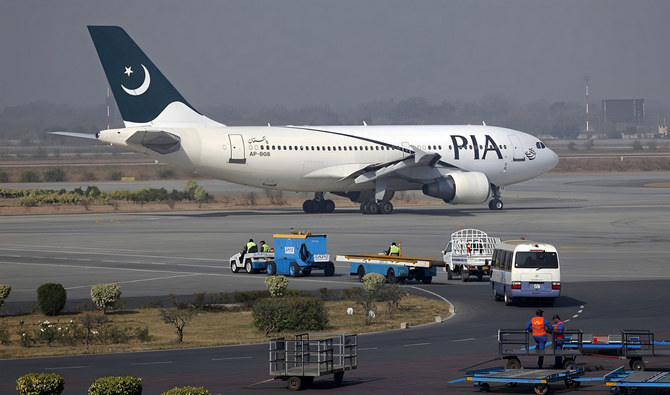Pakistan International Airlines (PIA) has resorted to ground several aircraft as it struggles to secure funds to maintain its operations for the next few months, during which time its core functions and non-core assets are expected to be put up for sale.
The Ministry of Aviation issued a stern warning last week, telling the federal government that PIA currently grapples with a severe cash flow crisis, leading to arrears with creditors, aircraft lessors, fuel suppliers, insurers, international and domestic airport operators, and even the International Air Transport Association (IATA).
Consequently, the national flag carrier has been compelled to ground five of its 13 leased aircraft, with the possibility of four more facing a similar fate, the ministry said.
Adding to the mounting concerns, the Ministry of Aviation disclosed that Boeing and Airbus are on the verge of discontinuing the supply of spare parts by mid-September. Considering these challenges, the ministry has requested an immediate cash injection of Rs23 billion, and the suspension of duties, taxes and service charges to domestic agencies. However, this request comes without the presentation of a concrete and viable business plan.
The ministry cautioned that the PIA’s restructuring is a complex process that is expected to span around eight months. It also emphasised that for the divestment of PIA’s shares to yield a fair value, the airline must remain operational throughout all stages of restructuring.
Regrettably, PIA serves only a fraction of the country’s population, accounting for less than 3pc of citizens using air travel while consuming significant public funds. This stands in stark contrast to the highly criticised and loss-making power companies that cater to nearly 80pc of the population with electricity.
The government of Pakistan holds a 92pc share in PIA, which was once known for its slogan “Great People to Fly With”. However, since the late 1990s, the airline has faced mounting losses, attributed to competition from emerging regional airlines, a lack of entrepreneurship, external influences, internal mismanagement, and insufficient funding for fleet expansion, as highlighted by the Aviation Division.
To cope with its financial losses, PIA accumulated significant debt, which has now reached unmanageable levels. As of Dec 31, 2022, PIA’s debt and liabilities stood at Rs743bn — five times more than the total value of its assets, the Aviation Ministry said, adding that its total losses for the last financial year (2022-23) stood at Rs86.5bn, out of which Rs11bn were operational losses.
“If the situation continues as such, PIA’s debt and liabilities will rise to Rs1,977bn and its annual losses will rise to Rs259bn per annum by 2030,” it put on record, warning that Rs383bn of the current debt liability of PIA stood underwritten by the government of Pakistan and being 92pc owner, the responsibility for the remaining payables also ultimately rested with it.
Several attempts were made in the last decade or so to make PIA sustainable. These attempts followed two basic approaches. The first approach mainly focused on turning the PIA around by cutting down cost, improving internal management and increasing fleet size with capital investment from the government. However, several attempts of this nature failed to make any headway.
The second approach focused on financial, legal, operational, commercial and human resources restructuring of PIA to clean its balance sheet, aiming to attract private investment through divesting government shares. This approach was identified first in the Dubai Islamic Bank Consortium Report of 2017 that was engaged by the Privatisation Commission and later in Dr Ishrat Hussain Report on PIA Restructuring Plan in 2020.
PIA also carried out a study to formulate a sound business plan to make it profitable by engaging IATA, which also recommended a similar approach while indicating a capital injection of $3.5bn over a period of five years to enhance fleet size from 29 aircraft in 2021 to 49 in 2026. However, none of these reports could be implemented for various reasons.
In view of the continued deterioration of the financial condition of PIA, in June 2023, it was decided to restructure PIA broadly on the lines recommended by the Dubai Islamic Bank Consortium Report. To steer this process, a committee under the then finance minister was constituted to steer and guide the restructuring effort.
Under the directives of this committee, the PIA’s board of directors approved a plan on July 25 this year to restructure PIA in light of the aforesaid report by incorporating a new holding company to retain legacy loans, non-aviation assets and existing PIACL subsidiaries (PIA-IL, Skyrooms Limited, and Saber Travel Network), with PIACL as its wholly owned subsidiary retaining aviation assets and relating liabilities.
Another major hurdle in that direction has also been removed since then. The previous provisions of PIACL Act, 2016 did not allow the transfer of management control and more than 49pc shares of PIACL to a private entity and hence were not conducive for attracting private investment. However, an amendment act was promulgated on Aug 12 and these restrictions have now been removed and PIACL was included in the privatisation list of the Privatisation Commission with the approval of the cabinet on Aug 7.
The restructuring plan is yet to be approved by the government. The Aviation Division last week asked the government to inject Rs23bn funds to cover the markup payment, suspend Rs1.3bn and Rs700m to the FBR and the Civil Aviation Authority, respectively, and defer loans and markup till restructuring is complete in about eight months.
This did not impress Caretaker Finance Minister Dr Shamshad Akhtar at the back-to-back meetings of the ECC and the Cabinet Committee on Privatisation.
The two committees then decided to form a separate panel to assess PIA’s restructuring plan and directed the finance ministry and the State Bank of Pakistan to support the airline to tackle its financial challenges after a concrete plan of restructuring had been finalised.

